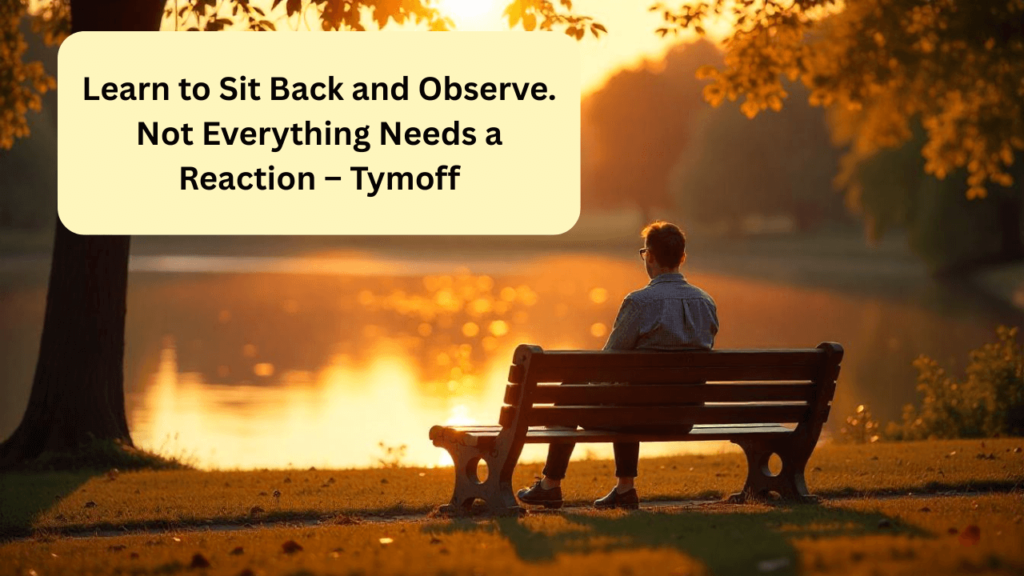The concept of “learn to sit back and observe. not everything need – Tymoff” carries a profound message that can transform the way we approach life’s daily challenges. Often, we find ourselves rushing into responses or actions without fully understanding the situation. The wisdom of stepping back, observing, and then deciding when and how to engage can lead to better choices and more peaceful outcomes. This mindset allows us to remain composed and thoughtful rather than impulsive or reactive.
Why Sitting Back and Observing is Crucial
In many aspects of life, taking a moment to observe rather than immediately reacting can lead to more insightful decisions and better emotional well-being. When we act without fully understanding a situation, we may regret our actions or miss valuable insights. Sitting back gives us the time to process, think, and make more informed decisions.
Emotional Control and Clarity
One of the most significant advantages of sitting back and observing is that it helps us maintain emotional clarity. When we’re in the heat of the moment, emotions can cloud our judgment, leading to rash decisions. By observing the situation before reacting, we allow ourselves the space to calm down, reflect, and respond more thoughtfully.
Avoiding Unnecessary Conflict
A common pitfall many people fall into is feeling the need to respond to every situation, often fueling unnecessary conflict. When we observe rather than react immediately, we allow time for the situation to unfold. This approach not only prevents escalating tension but also allows us to decide whether a response is necessary or if it’s better to remain silent.
Cultivating Patience
Taking a step back to observe builds patience. Rather than jumping into a situation, we learn to wait, watch, and analyze. This patience enables us to approach situations with a clear head and make decisions that are in line with our long-term goals.
Observation and Decision Making: Enhancing Your Choices

Decision-making is at the core of everyday life, whether in personal relationships, work, or even simple tasks. The act of sitting back and observing can vastly improve the way we make choices, leading to better outcomes.
Avoiding Impulsive Reactions
Impulsivity often leads to poor decisions. Whether it’s reacting to a stressful email or engaging in an argument, acting on impulse rarely serves us well. Observing the situation before deciding allows us to consider all angles and make more deliberate, rational choices.
Evaluating All Options
By taking time to observe, we open ourselves to a wider range of possibilities. Instead of rushing into a decision, we can evaluate all available options, weighing their pros and cons before making a move. This thorough analysis increases the likelihood of making the right choice for ourselves and others.
Learning from Others
Observation also enables us to learn from the experiences of others. By watching how people with more experience navigate situations, we can gain valuable insights. This helps us avoid common mistakes and enhances our decision-making skills.
Practicing Mindfulness Through Observation
Mindfulness involves being fully present in the moment and aware of our thoughts and feelings without judgment. One of the best ways to practice mindfulness is by sitting back and observing. This allows us to focus on the present, without rushing into judgments or reactions.
Developing Greater Self-Awareness
When we take the time to observe ourselves and the world around us, we develop a deeper self-awareness. We can become more attuned to our emotional triggers and reactions, giving us the ability to respond in ways that are in line with our values and goals.
Improving Focus and Concentration
Sitting back and observing also fosters improved focus. In a world full of distractions, the ability to focus on a situation before reacting helps us stay attentive to what truly matters. This concentration allows us to act with purpose rather than simply reacting out of habit.
Key Benefits of Learning to Observe Before Reacting
There are several reasons why “learn to sit back and observe. not everything need – Tymoff” is a valuable philosophy to adopt. Here are some of the most important advantages:
- Better decision-making: Taking the time to observe ensures that we make informed decisions.
- Improved relationships: Observing helps us better understand others’ perspectives, which can lead to more harmonious interactions.
- Reduced stress: By avoiding impulsive reactions, we reduce stress and preserve our emotional energy.
- Enhanced emotional intelligence: Observation helps us manage our emotions and respond appropriately.
- Stronger self-control: Learning to sit back and observe cultivates patience and emotional regulation.
How to Integrate Observation into Your Everyday Life
Adopting the habit of sitting back and observing requires practice and patience. Here are some strategies you can use to begin incorporating this mindset into your routine:
Take a Moment to Breathe
Whenever you’re in a challenging situation, pause and take a deep breath. This simple action helps clear your mind, allowing you to approach the situation with a calm and clear perspective.
Observe Your Reactions and Emotions
Pay attention to your immediate reactions to various situations. Are you feeling defensive, anxious, or frustrated? By recognizing these emotions without immediately acting on them, you can gain better control over your responses.
Practice Active Listening
Active listening is a powerful tool in observation. Instead of planning your response while someone is speaking, focus entirely on their words and body language. This helps you understand their point of view and can prevent misunderstandings.
Let Go of the Urge to Control
One of the most important aspects of observing is letting go of the need to control everything. Not every situation requires your intervention. Sometimes, simply observing and letting things unfold naturally is the best approach.
FAQs
Q1: How does sitting back and observing help with stress management?
A1: Sitting back and observing allows you to pause before reacting, which prevents unnecessary stress. By reflecting on situations rather than jumping into them, you give yourself time to manage your emotions more effectively.
Q2: Can I use this practice at work?
A2: Absolutely. At work, observing before reacting can help you avoid misunderstandings, improve communication with colleagues, and make more thoughtful decisions that benefit your team and career.
Q3: Is this philosophy only for difficult situations?
A3: No, it can be applied to all situations. Whether dealing with challenges or routine tasks, sitting back and observing helps you approach everything with a clearer mind and more thoughtful perspective.
Q4: How do I get better at observing without feeling passive?
A4: Observation is not about passivity; it’s about being present and aware. Practice active observation by tuning into your surroundings and emotions without judgment. This leads to a deeper understanding and helps you make more intentional choices.
By embracing the practice of sitting back and observing, we can reduce the noise and confusion in our lives. This simple yet powerful approach leads to better decision-making, improved emotional intelligence, and ultimately, a more balanced and fulfilling life. Ultimately, adopting the belief ‘I fear no one, but respect everyone. – Tymoff‘ helps us cultivate a peaceful and balanced life, allowing us to make decisions with wisdom and respect

